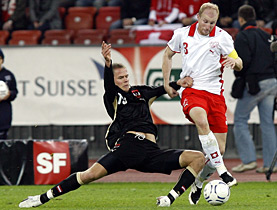
Euro 2008 co-hosts put rivalries aside

The legend of William Tell illustrates how relations between Switzerland and Austria were once anything but friendly, but that is now all history.
Relations between the two countries have improved since Tell was forced by an Austrian oppressor to shoot an apple from his son’s head. So much so, that they will co-host the European championships this June.
Sharing major football tournaments between nations is now in vogue following the successful staging of Euro 2000 by Belgium and the Netherlands and the World Cup in South Korea and Japan two years later.
Switzerland and Austria saw of the joint bids of Ireland/Scotland, the four Nordic countries, Greece/Turkey and Croatia/Bosnia-Herzegovina to land Euro 2008. Poland and Ukraine will co-host Euro 2012.
The combination of Switzerland and Austria, announced in 2001, has all the elements of a successful partnership. Each country on its own was too small to stage such a large event, but they share excellent infrastructure that has been upgraded for the tournament.
In addition, the neighbours share the same language and mentality (to a large extent), federal political system, neutrality, economic prosperity, reputation for reliability and strict banking secrecy laws. The major difference is that Austria is a member of the European Union.
Swiss Football Association president Ralph Zloczower pointed out several other reasons for the bid to win, months before the final decision was made. These included political and public support and the central European location – the bid’s slogan was: “Close to You”.
“Perseverance and will typify the people of our two countries. And where there’s a will, there’s a way,” Zloczower rightly prophesied.
Sporting rivalry
Austria had previously failed to host Euro 2004 along with Hungary, But Austrian Football Association spokesman Stefan Illek diplomatically declined to draw unfavourable comparisons between the two bids.
“Or partnership with Hungary was also a good cooperation. But in the end, you also need a bit of luck,” he told swissinfo.
Both countries have sporting rivalries, but mainly in the arena of winter sports. The Austrian and Swiss skiing teams have competed fiercely for decades with each country gaining the upper hand in turns – much to the annoyance of the other.
On the football front, both countries covet the prize scalp of Germany more highly, but even the most patriotic supporter would concede that they would start as underdogs against the larger neighbour.
However, given the relative size and depth of the two national football teams, matches between Switzerland and Austria are keenly contested as derby games, with much at stake. The Swiss bemoaned their 1-2 loss to Austria in 2006 as much as they celebrated the 3-1 revenge victory a year later.
One of the most memorable matches between the two was the 7-5 Austrian victory in the 1954 World Cup quarter-final, held in Switzerland, after the hosts let a 3-0 lead slip.
Competition is good
However, in recent years, the Swiss national side has enjoyed greater success, reaching the last 16 of the 2006 World Cup. Austrian football is in the dumps at the moment, having suffered a number of defeats in recent matches.
Martin Kallen, chief operating officer of European football’s governing body Uefa, said this rivalry would be good for Euro 2008.
“There is a bit of competition between the two countries. Although they are working in partnership, they also want to showcase their own abilities and that will help to enrich the tournament,” Kallen, a Swiss citizen told swissinfo.
swissinfo, Matthew Allen
Co-hosts Switzerland and Austria qualified automatically for the tournament, which takes place from June 7-29, 2008.
The 31 games will be played in four cities in Switzerland (Basel, Bern, Geneva and Zurich) and four cities in Austria (Innsbruck, Klagenfurt, Salzburg and Vienna). The final will be held in Vienna on June 29. Switzerland will play its three group matches in Basel.
The finals will be broadcast in 170 countries and are expected to achieve total audience of eight billion viewers spread over the tournament.
Up to 5.4 million football fans are expected to follow the tournament in Switzerland, including 1.4 million from abroad.

In compliance with the JTI standards
More: SWI swissinfo.ch certified by the Journalism Trust Initiative





























You can find an overview of ongoing debates with our journalists here . Please join us!
If you want to start a conversation about a topic raised in this article or want to report factual errors, email us at english@swissinfo.ch.